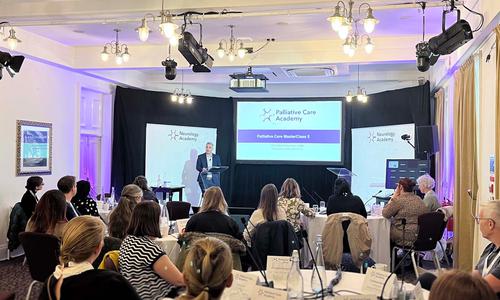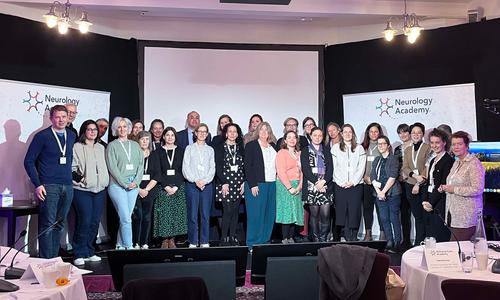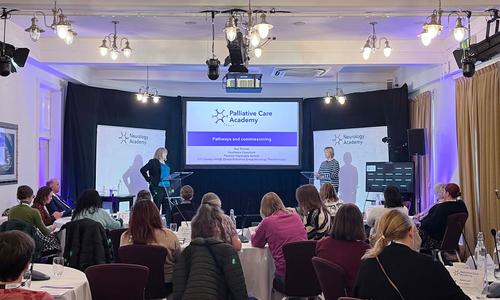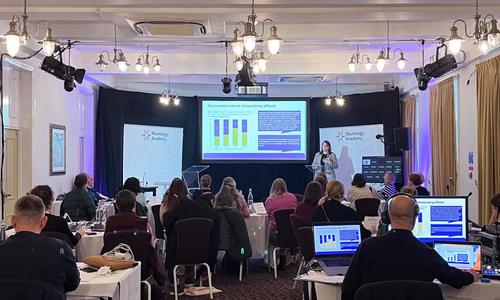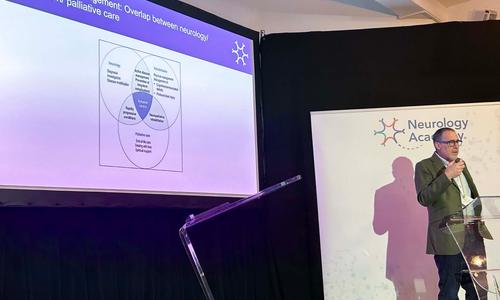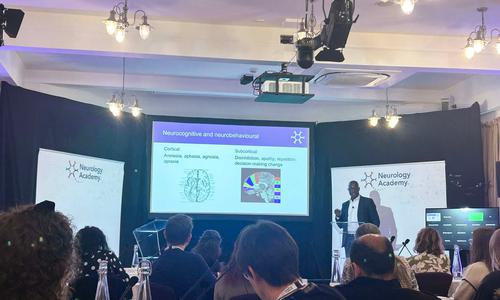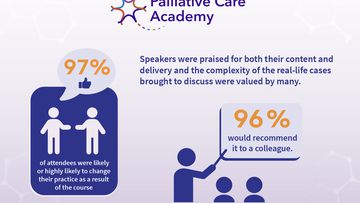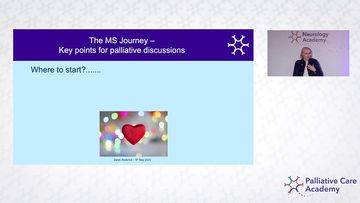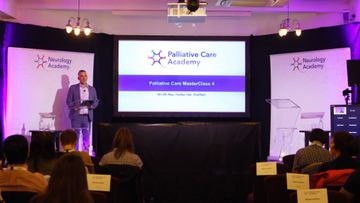Where neurology meets palliative care: highlights from our 5th Palliative Care MasterClass
Event reportsIn November, we were delighted to host our 5th Palliative Care MasterClass, a unique course designed to cultivate a dual specialism in neurology and palliative care. Held in Sheffield at Halifax Hall, the course brought together over 45 healthcare professionals: 25 delegates joining us in person and more than 20 virtually via our live stream.
To ensure a strong foundation regardless of their background, delegates first completed a self-directed virtual module covering the basics of palliative care and neurology. This prepared them to fully engage in the packed two-day residential course, which delves deeply into the space where the two specialisms meet.
The MasterClass blends expert-led presentations with interactive case discussions. Over two days, delegates tackled specific challenges across 4 themes: dementia, Parkinson's, multiple sclerosis (MS) and motor neurone disease (MND). Sessions also addressed pan-condition complexities and the principles of providing compassionate care in clinical practice.
Interactive case discussions, a signature element of the course, allowed multidisciplinary teams to work through real-world challenges. These sessions encouraged collaboration and practical application of knowledge, equipping participants with actionable insights to enhance their daily practice.
“I think this is one of the best courses I have been on in a long while. The quality and credibility of the speakers were exceptional. I have so much to take away, it was inspiring.”
“This MasterClass has given me more enlightenment on having palliative care involved as 'early as possible'. I'm glad I went this year!”
Delegate feedback
A growing focus on holistic care
This year’s programme introduced two thought-provoking new sessions, reflecting the evolving emphasis on holistic care. Rev Andrew Goodhead, lead chaplain and visiting lecturer at King’s College London, delivered a powerful session on spirituality in healthcare. Delegates explored the concept of “multiple deaths” experienced by individuals with chronic neurological conditions and the overlapping roles of spiritual and psychological care. The session highlighted how these elements can complement one another within a service. A key takeaway was the importance of clinician self-care, ensuring that healthcare professionals are supported as they support others. The session sparked lively discussions, with many delegates expressing a desire to build their understanding and enhance their ability to offer appropriate support or signposting in this area.
Delegate feedback from this session:
“Loved the introduction of concepts such as healing through suffering, theodicy and freedom from fear. Helpful to hear this perspective, particularly within the context of all the conversations around assisted dying.”
"As a non-spiritual person myself, I often find it difficult to support patients with this, although I always put my own views aside, I still feel that I have not supported them fully with this. But this talk gave me the incentive to consider this more going forward.”
“Outstanding, and very inspirational, this talk will stay with me for a long time.”
“This was such an important addition to the programme. The concept of just being there, being privileged to share some of the conversations that people have. I am thinking about running a session for medical students on faith and spirituality in end of life care.”

Another new addition was a session led by James Townsed, CEO and co-founder of Mobilise on the vital role of unpaid carers. Delegates gained practical tools to identify and support carers, along with insights into legal frameworks and carer assessments. The session emphasised the profound impact of unpaid carers and offered strategies for healthcare professionals to better advocate for them.
Delegate feedback from this session:
"Another inspiring speaker, I will definitely be taking information about Mobilise back to my team and patient group.”
“A very informative talk, I had not heard of Mobilise before. I will be discussing this with my patients and their carers/relatives.”
Tackling complex themes with an MDT approach
The course welcomed professionals from a variety of specialties, including neurology, elderly care, psychiatry, palliative care, rehabilitation and general practice and a diverse range of healthcare roles. The interactive format allowed delegates to not only learn from our faculty of expert speakers but also share their own experiences and learn from one another. It was inspiring to see how participants embraced the opportunity to bridge gaps between specialties and work collaboratively in small multidisciplinary teams.
“Fantastic. One of the best (if not the best) courses I have been on. I loved the MDT approach and learning from each other. Thank you all.”
Delegate feedback
Speakers find the opportunity to meet with and learn from each other during the planning and delivery of sessions is key to their motivation to be involved.
“I am incredibly privileged to be invited to and take part in these meetings, thoroughly enjoyable and educational.”
“It is a long time since I learnt so much from colleagues in such real and interesting discussions.”
“Neuro Academy is always so well organised, such high level education and helpful, professional and friendly team.”
Speaker feedback
We’d like to thank all our speakers and faculty for making this event such a success, and our delegates for their active participation and thoughtful feedback. The session recordings from this MasterClass will soon be available as an on-demand virtual course. Keep an eye on our website for details of future learning opportunities in palliative care and subscribe to our mailing list.

This meeting has been part funded by sponsorship from Zambon UK Limited. The sponsor has had no control over the educational content or the organisation of this meeting.
Related articles
For every person, at any stage
Palliative Care Academy challenges the idea of palliative care as a late-stage service. Whilst recognising the practical nuances and bespoke approaches needed in palliative care for people with dementia, Parkinson's, MS and motor neurone disease respectively, the Academy promotes a holistic and positive approach to palliative care at any stage of any condition.
